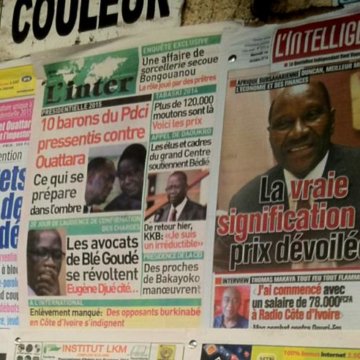- About
- Topics
- Picks
- Audio
- Story
- In-Depth
- Opinion
- News
- Donate
-
Signup for our newsletterOur Editors' Best Picks.Send
Read, Debate: Engage.
The International Criminal Court should be doing more to focus on improving victim outcomes, according to a senior international justice counsel at Human Rights Watch.
Elizabeth Evenson has published a report on the ICC’s work in Côte d’Ivoire and how its activities could be improved to better serve those wronged by the 2010 conflict following the presidential election in the African nation, but also elsewhere.
A major criticism of the ICC’s prosecution in Côte d’Ivoire is that it has only prosecuted those on one side of the conflict, although members of both sides were implicated. A lack of communication, resources and funding has meant that while criminal cases have been opened against forces allied with former president Gbagbo, as well as Gbagbo himself, none have so far been taken against supporters of current President Ouattara.
Evenson reports that: “The prosecutor has to make really difficult decisions about who to prosecute – she can’t investigate all the crimes committed in a conflict. But that means the cases her office does prosecute need to try to create as much impact as possible.”
“The prosecution should have better reflected what happened to victims, across the conflict. Going forward, in Côte d’Ivoire and in other countries where the ICC is investigating, we think the prosecution should do more to put into practice its standing commitment to consult more with victims as part of making decisions about whom to prosecute and for what. Otherwise, if cases don’t better reflect the experience of more victims, ultimately, the court can seem irrelevant to victims and communities in the countries where investigations are conducted.”
A lack of presence in the country has meant that the ICC Registry, in charge of outreach, has not been able to assure the public of its liability through contact with journalists and citizens.
“There’s a lot of awareness of the ICC in Côte d’Ivoire because a former president is on trial. But the ICC can be very difficult to understand – why did the prosecution make the choices it made, which victims can access rights before the court – and the ICC hasn’t been able to provide that kind of information to a broad enough set of people,” explains Evenson.
This has since been rectified with a fulltime outreach staff member present in Abidjan office since October 2014.
But funding remains an issue. “Money shortfalls are the backdrop for many of the court’s decisions we saw in Côte d’Ivoire. This is particularly true for its outreach activities – the court told us they really didn’t have the money to have done things differently. And we’ve seen this shortfall in outreach in other countries where the ICC is investigating, too.”
“Sometimes I get the feeling that the court only has enough funding to put out fires, rather than to execute a solid strategy, whether in terms of what cases to bring or how to really make sure the court’s work is accessible and meaningful for local communities.”
